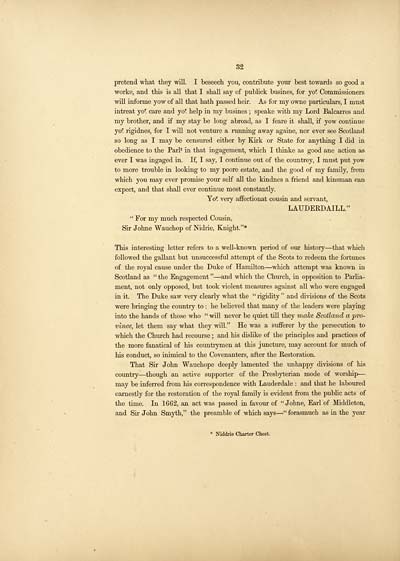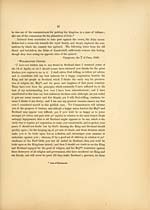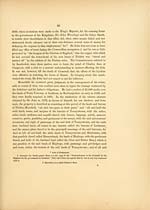Download files
Complete book:
Individual page:
Thumbnail gallery: Grid view | List view

32
pretend what they will. I beseech you, contribute your best towards so good a
worke, and this is all that I shall say of publick busines, for yo* Commissioners
will informe yow of all that hath passed heir. As for my owne particulars, I must
intreat jo T . care and yo* help in my busines ; speake with my Lord Balcarres and
my brother, and if my stay be long abroad, as I feare it shall, if yow continue
yo* rigidnes, for I will not venture a running away againe, nor ever see Scotland
so long as I may be censured either by Kirk or State for anything I did in
obedience to the Pari* in that ingagement, which I thinke as good ane action as
ever I was ingaged in. If, I say, I continue out of the countrey, I must put yow
to more trouble in looking to my poore estate, and the good of my family, from
which you may ever promise your self all the kindnes a friend and kinsman can
expect, and that shall ever continue most constantly.
Y0* very affectionat cousin and servant,
LAUDERDAILL."
" For my much respected Cousin,
Sir Johne Wauchop of Nidrie, Knight."*
This interesting letter refers to a well-known period of our history — that which
followed the gallant but unsuccessful attempt of the Scots to redeem the fortunes
of the royal cause imder the Duke of Hamilton — which attempt was known in
Scotland as "the Engagement" — and which the Church, in opposition to Parlia-
ment, not only opposed, but took violent measures against all who were engaged
in it. The Duke saw very clearly what the "rigidity " and divisions of the Scots
were bringing the country to : he believed that many of the leaders were playing
into the hands of those who " will never be quiet till they make Scotland a pro-
vince, let them say what they will." He was a sufferer by the persecution to
which the Church had recourse ; and his dislike of the principles and practices of
the more fanatical of his countrymen at this juncture, may account for much of
his conduct, so inimical to the Covenanters, after the Restoration.
That Sir John Wauchope deeply lamented the unhappy divisions of his
country — though an active supporter of the Presbyterian mode of worship —
may be inferred from his correspondence with Lauderdale : and that he laboured
earnestly for the restoration of the royal family is evident from the public acts of
the time. In 1662, an act was passed in favour of "Johne, Earl of Middleton,
and Sir John Smyth," the preamble of which says — " forasmuch as in the year
* Niddrie Charter Chest.
pretend what they will. I beseech you, contribute your best towards so good a
worke, and this is all that I shall say of publick busines, for yo* Commissioners
will informe yow of all that hath passed heir. As for my owne particulars, I must
intreat jo T . care and yo* help in my busines ; speake with my Lord Balcarres and
my brother, and if my stay be long abroad, as I feare it shall, if yow continue
yo* rigidnes, for I will not venture a running away againe, nor ever see Scotland
so long as I may be censured either by Kirk or State for anything I did in
obedience to the Pari* in that ingagement, which I thinke as good ane action as
ever I was ingaged in. If, I say, I continue out of the countrey, I must put yow
to more trouble in looking to my poore estate, and the good of my family, from
which you may ever promise your self all the kindnes a friend and kinsman can
expect, and that shall ever continue most constantly.
Y0* very affectionat cousin and servant,
LAUDERDAILL."
" For my much respected Cousin,
Sir Johne Wauchop of Nidrie, Knight."*
This interesting letter refers to a well-known period of our history — that which
followed the gallant but unsuccessful attempt of the Scots to redeem the fortunes
of the royal cause imder the Duke of Hamilton — which attempt was known in
Scotland as "the Engagement" — and which the Church, in opposition to Parlia-
ment, not only opposed, but took violent measures against all who were engaged
in it. The Duke saw very clearly what the "rigidity " and divisions of the Scots
were bringing the country to : he believed that many of the leaders were playing
into the hands of those who " will never be quiet till they make Scotland a pro-
vince, let them say what they will." He was a sufferer by the persecution to
which the Church had recourse ; and his dislike of the principles and practices of
the more fanatical of his countrymen at this juncture, may account for much of
his conduct, so inimical to the Covenanters, after the Restoration.
That Sir John Wauchope deeply lamented the unhappy divisions of his
country — though an active supporter of the Presbyterian mode of worship —
may be inferred from his correspondence with Lauderdale : and that he laboured
earnestly for the restoration of the royal family is evident from the public acts of
the time. In 1662, an act was passed in favour of "Johne, Earl of Middleton,
and Sir John Smyth," the preamble of which says — " forasmuch as in the year
* Niddrie Charter Chest.
Set display mode to:
![]() Universal Viewer |
Universal Viewer | ![]() Mirador |
Large image | Transcription
Mirador |
Large image | Transcription
Images and transcriptions on this page, including medium image downloads, may be used under the Creative Commons Attribution 4.0 International Licence unless otherwise stated. ![]()
| Histories of Scottish families > History and genealogy of the family of Wauchope of Niddrie-Merschell > (40) Page 32 |
|---|
| Permanent URL | https://digital.nls.uk/95384787 |
|---|
| Description | A selection of almost 400 printed items relating to the history of Scottish families, mostly dating from the 19th and early 20th centuries. Includes memoirs, genealogies and clan histories, with a few produced by emigrant families. The earliest family history goes back to AD 916. |
|---|

